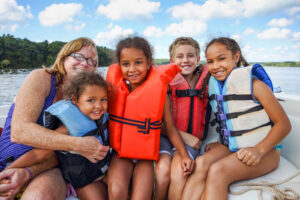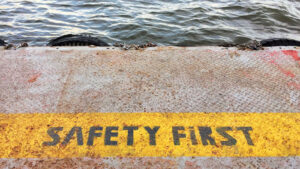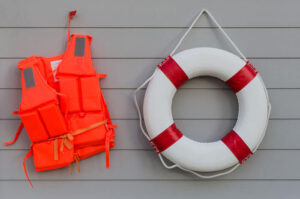Now that summer is in full swing, more and more Louisiana residents are taking time to enjoy their favorite boating activities. At Huber Thomas Law, we want our clients to have a great time – but we want to keep them safe, too.
The bad news is that boating accidents are on the rise. Recreational boating accidents rose 18% from 2019 to 2020, from 105 to 124. In 2020, 24 people lost their lives in boating accidents. These statistics are similar to trends across the country, with a 26.3% overall increase in boating accidents from 2019 to 2020.
The good news is that most of these accidents could be prevented if proper boating safety tips are followed. According to the Coast Guard, five factors contribute to most boating accidents:
- Operator inattention
- Operator inexperience
- Improper lookout
- Excessive speed
- Machinery failure
Read on to learn the best boating safety tips to follow. Of course, nothing can prevent 100% of accidents. If you suffer an injury in a boat accident, contact Huber Thomas Law at (504) 274-2500 for a free legal consultation.
Wear a Life Jacket
Three out of four people who die in a boating accident drown. About 86% of those who drowned in boating accidents were not wearing life vests. It is essential to wear a life jacket at all times to protect you if you enter the water unexpectedly.
Federal law requires that every boat has at least one U.S. Coast Guard-approved life jacket for each person aboard the boat. Louisiana boating laws require that children under the age of 17 wear a life jacket if they are on a vessel less than 26 feet.
People of all ages on a motorboat less than 16 feet long with a hand tiller outboard motor must wear a life jacket while the boat is moving. Everyone aboard a pirogue, kayak, personal watercraft, or kayak.
Wear the Right Life Jacket
Remember that the job of a life jacket is more than just keeping you afloat. The best models are designed to turn a person's face up if they are unconscious, and some are even designed to protect against hypothermia.
Before choosing a life jacket, try it on by fastening the vest. Then hold your arms straight above your head and ask someone to pull the top of the arm opening. The vest should fit snugly. Buy a life jacket that fits the specific type of on-water activity you will be doing. For example, if you'll be fishing, find a life jacket with pockets and straps to carry supplies.
Have a Boat Safety Kit on Board
Be ready for everything because you can never be too sure when an emergency will arise. No matter the size of your boat, you should always have your boat safety kit with you, and this kit should have the following items.
-
A Flashlight
If you run out of gasoline or your boat stalls, a flashlight and additional batteries will help you see around your boat in the dark. It can also make you visible to other boats if you are in distress at night.
-
Duct tape
If something is leaking on your boat, duct tape can work wonders as a temporary fix.
-
A Bucket
In the event water enters your boat, a bucket can be instrumental in quickly getting it out.
-
First Aid Kit

In the event of an accident or medical emergency, having a first aid kit that is fully stocked and knowing how to utilize it is essential. It should include:
- A first aid guide.
- Over-the-counter pain medication
- Eyewash
- Burn cream
- Cotton pads or swabs
- Bandages
- Antiseptic cream or spray
- Absorbent pads
- Rolled gauze
- Foil blanket
- Tweezers
- Alcohol wipes
- Disposable gloves
-
Ropes
Ropes are essential for rescuing someone who has fallen overboard, docking your boat, and fastening loose objects in bad weather.
-
Trash Bags
Garbage bags can be used as ponchos in the rain to protect objects on board.
-
Fire Extinguisher
Just because you're on the water doesn't mean that you can't have a fire inside your boat. Your fire extinguisher should be accessible to all passengers, and they should all know where to use it.
Follow Proper Docking and Anchoring Procedures
Make sure that you adhere to suitable anchoring techniques. It's not enough to have the proper anchor. You might need to drop two anchors in the shape of a V at the front of the boat to prevent it from drifting in the wind. It could be necessary to place your anchor in deeper water, perhaps 20 to 30 feet deep, to help prevent the tide from raising it.
Docking might be difficult depending on the wind, the current, and your type of boat. Make sure your bumpers are out as you go closer to the dock or shore to protect your ship, slow down, and make sure the docking lines are fastened. Bring the boat about two feet from the dock if the wind is blowing in that direction; the breeze will then gently pull it in. Then you can use lines to secure it. Approach the dock at a 20-to-30-degree angle to account for the wind if it is blowing away from the beach. Then tighten the bow line.
Remember that these boating safety tips only cover the basics. If you are not experienced in proper docking and anchoring procedures, consider the next suggestion. In addition to the above, here are also some additional tips to keep you accident free this summer.
The Best Boating Safety Tip: Take a Boat Safety Course
According to the U.S. Coast Guard, operator error is at blame for 70% of boating accidents. Make sure you are familiar with the guidelines and your obligations before you leave the port. There are many online courses accessible, some of which are free.
A free online boating safety education designed expressly for each state is available from The Boat U.S. Foundation. A further selection of online and in-person courses for boating safety is provided by the U.S. Coast Guard.
What Should You Do if You Are Involved in a Boating Accident?
No matter how closely you follow boating safety tips, you cannot prevent 100% of boating accidents. Boating mishaps are terrifying, and it might be challenging to know what to do or how to react in the heat of the moment. It's critical to keep in mind what to do in the aftermath of a boating disaster to protect your legal rights, prevent more injuries, and maybe save lives.
-
Ensure the Safety of Everyone on Board

Finding out if anyone requires medical assistance should come first in a boating accident if you are on board and the boat is still floating. If you can, help anyone who has fallen overboard get back aboard the boat. If the boat is breaking apart or sinking, you should climb onto any accessible rafts or floating debris and call for assistance. You should put on your life jacket to stay afloat until help arrives.
-
Inform the U.S. Coast Guard of the incident
If the boat is still moving, pull it away from approaching vessels. As soon as possible, get in touch with the U.S. Coast Guard to report the mishap, its location, and whether any medical aid is necessary. Certain boating incidents must be reported in accordance with federal law, such as when a person is killed or when the damage to the vessel costs $2,000 or more.
When a boating accident occurs, stay at the scene. Just as in a car accident, you have a responsibility to report the incident and help with the investigation, especially if anyone is hurt.
-
Gather Information
You should acquire specific information at the accident scene. This includes:
- Name and contact information of any passengers on your boat or any other boats involved in the collision, and from any eyewitnesses who may have observed the accident from land or other boats
- Other boats' registration numbers
- Insurance information, including names, addresses, and policy numbers, for all other vessels involved in the accident
- Pictures of the boat damage, the accident site, and any other details you want to document or keep track of, if it's safe to do so
-
Contact a Louisiana Boating Accident
Louisiana law allows you to file a claim for damages sustained during your accident if you were injured due to someone else's negligence. This could include medical costs, property damage, pain and suffering, and more.
